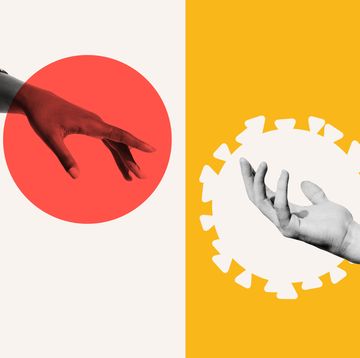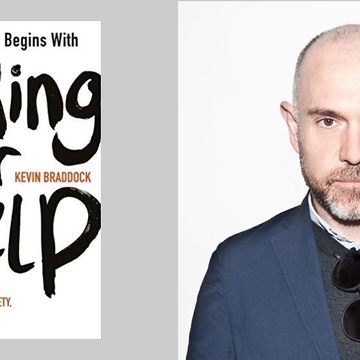Alastair Campbell was chief spokesman and strategist in Tony Blair’s Labour party between 1994 and 2003. Since then he has remained one of the most outspoken political figures in the UK. He is also one of the few to openly discuss his problems with mental health.
Here, in a conversation with Sam Parker, Campbell remembers a moment in 2010 when he almost broke down while being interviewed by Andrew Marr on live TV, and reflects on what he has learned about coping with depression.
I still don’t really know what happened. It was a long silence, wasn’t it? Even a few seconds on telly can feel like forever.
On one level his question was perfectly fair. He was just doing his job. But I was in the middle of quite a depressed phase, and I just thought: ‘this is fucking pointless. What’s the fucking point in me talking about this anymore?’. It didn’t feel like a panic attack, but I was incredibly anxious about what I would do. I was worried I was going to twat him. I was worried about Mum watching, because she always did. It’s a strange thing.
Another thing about me: when I get depressed, one of the first things that goes is my voice. I knew on that interview my voice was weak. That’s why I went quiet. Usually I first know depression is coming on because of an internal jangling feeling. But sometimes it’s when I speak and my voice isn’t right.
All this stuff was going on in my life at the time. I was trying to get things better with [my partner] Fiona. I had this endless tension with Gordon [Brown], me trying to get out [of politics] and him trying to get me in. It was a massive tension. He wasn’t happy and I wasn’t happy. I think I felt trapped.
I was in that same spot a few months later doing something with Paxman. I was never nervous with Paxman. But I felt exactly the same - because it was the same studio. The same feeling came on. It was triggering something. As we were about to go on air, I said to Paxman: ‘I don’t know what’s going on but I don’t feel right’. I took out my asthma inhaler because I was breathing really heavily. He thought it was an asthma attack.
He was brilliant actually, Paxman. He just said, ‘let me know. We are coming to you first but if you’re not ready, we’ll go to someone else’. Anyway, I calmed down and I was fine, but it was after that I thought: ‘something’s not right, I need to see someone about this’.
Working with depression can be very hard, and if I’m really depressed and want to spend the whole day lying on the sofa facing the wall, I will. But I have developed techniques to help.
I think trying to keep busy, trying to stay motivated even when your rational mind is telling you not to, can be useful. It’s like when you’re in the dentist chair, and you hate it. You think: ‘this will end and pain has no memory’. I say that to myself when I’m depressed. This will end.
If I feel like I’m dipping, one of the first things I do now is tell Fiona: 'oh, fuck, I’m going down again'. I never used to do that. But then at least she knows, and she’s worked out ways to deal with it. Same with my kids. That’s the first thing.
The second thing, even if I’m low, is do some exercise. Even if it’s just walk up and down the stairs a few times. Or swimming, which I don’t actually like, but I get in the water anyway and paddle up and down for half an hour. You can be in your own world and not have to talk to anybody.
Creativity helps. Write down what you’re feeling. I force myself to do a blog or an article. Music. That’s also really important. I quite often make myself cry playing the bagpipes. I get in my bathroom and I play the bagpipes and I’ll make up it up as I go. That connects me to my family, to my Dad and brother who are dead and also played the pipes. That can be quite a visceral thing.
Crying is another thing. I remember when my first published diaries came out my son, Rory, said: ‘Dad, this is fine all this. But do we really have to put in all the crying shit?!’ But that’s what it is. I do quite often cry on my own. I don’t always know where it’s coming from, but I often feel released and better after it.
What’s my main piece of advice? Be open about how you’re feeling with the people who are closest to you. It’s very important. It might not be your parents, your wife, your kids. It might be a mate at work. Could be the guy you play golf with or the guy you met on the beach last year. But think of who it is and speak to them. You feel very isolated when this stuff’s going on. It will help you see that you’re not.
There’s no doubt the conversation around mental health has changed for the better. You’ve got the royals doing it, and that’s been amazing for the campaign. You’ve got more storylines in soaps, the media being more attentive.
That’s all fine, but I worry the policy makers use this as a substitute for what they actually need to do, which is invest in the services. It’s great that we’re talking about it, but if that means people don’t feel scared to see their GP to tell them they suffering, then the GP says: ‘yeah, if you wait nine months I might be able to get you to go and see somebody’. Where does that leave people?
Theresa May, when she became Prime Minister, said, ‘mental health is going to be a priority’. Well, I don’t know if she’s had time to look in a dictionary but priority means more important than the others. Brexit is our only priority and it’s a fucking disaster. So while I hope we keep talking the talk, I wish policy makers would walk the walk more.
Recently, I had a very bad dip. I often get depressed around holidays. When I go to a wedding or parties, where you’re meant to be happy and you’re meant to like everybody, sometimes I just don’t want to be there. The only real thing I enjoy, where it’s communal and everybody’s meant to feel the same, is football. I love that feeling.
Marilyn Monroe said: ‘think in ink’. So I write a lot. Writing the diaries, I’ve learnt so much about myself and my family and other people. It’s a way of checking in with your feelings. It’s really interesting. Eventually, I’ll die and be forgotten. But I think the diaries will still be around, and students and politics addicts of the future will look at them. I don’t have any grandchildren yet, but I like the idea of leaving a big slab of books on my grandchildren’s bookshelf. That would be great.
Alastair is supporting the GLAD mental health study into genetic links to anxiety and depression. Join the study here. His new diaries, Volume 7: From Crash to Defeat, 2007 - 2010, is out on 20 September.
For information and support regarding mental health, check out thecalmzone.net; mind.org.uk; consolecounselling.co.uk; samaritans.org.




